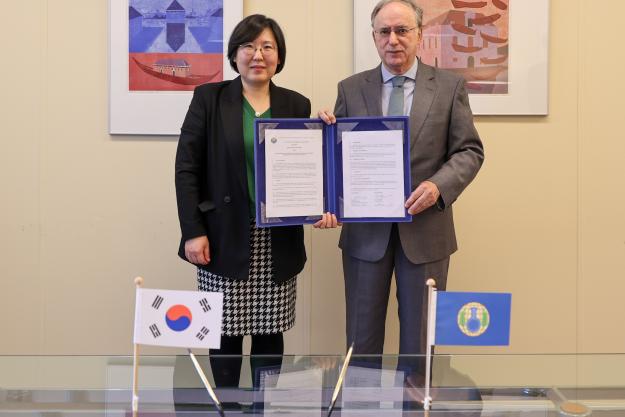The Government of the Republic of Korea has contributed around €95,000 to enhance capacity-building activities of the Organisation for the Prohibition of Chemical Weapons (OPCW) to strengthen research capabilities as well as chemical safety and security in Asia and Africa.
A contribution of EUR 70,000 will be used to organise the 14th edition of the annual Workshop on Peaceful Development and Use of Chemistry for States Parties to the Chemical Weapons Convention (CWC) in the Asian region in 2025 in Seoul. This workshop is a long-standing initiative fully funded by the Republic of Korea addressing the specific capacity-building needs in chemical safety and security in the region.
The remaining amount of the contribution, around EUR 25,000, will be allocated to a project designed to develop a technology platform allowing more precise biotoxin analysis. The contribution will support two fellows from African Member States, who will conduct six months of research related to this project at the OPCW Centre for Chemistry and Technology (ChemTech Centre). The OPCW will provide mentorship as well as state-of-the-art research facilities and equipment at the ChemTech Centre to support the fellows' work.

H.E. Ms Hyejeong Ahn, Minister and Consul-General at the Embassy of the Republic of Korea in the Netherlands, and Ambassador Fernando Arias, OPCW Director-General, during a ceremony to formalise South Korea's contribution to OPCW. The ceremony took place at OPCW Headquarters in The Hague, the Netherlands, on 19 February 2025.
The voluntary contribution was formalised on 19 February 2025 in a signing ceremony held between Ms Hyejeong Ahn, Minister and Consul-General at the Embassy of the Republic of Korea in the Netherlands, and the OPCW Director-General, Ambassador Fernando Arias, at the Organisation's Headquarters in The Hague.
"Capacity building through knowledge sharing and training is one of the essential tools to prevent the re-emergence of chemical weapons and promote peaceful uses of chemicals," said Ms Ahn.
"We are pleased to make voluntary contributions to two projects that can enhance the capacity of State Parties. In particular, the Seoul Workshop is a meaningful event that has been held annually for the last 13 years by the Republic of Korea to share best practices among Asian State Parties. Furthermore, we hope to contribute to strengthening the capabilities of research institutions in the African region through the African Fellowships in Biotoxin Analysis Programme," she added.
Director-General Arias stated: "The Republic of Korea has long recognised the importance of the Organisation's activities in research and capacity building, as demonstrated by the fact that they were the first OPCW Member State to provide financial support to the ChemTech Centre project. I commend the Republic of Korea's continued commitment to advancing OPCW's activities in these fields and thank them for their generous contribution today."
"Events such as the annual Seoul workshop are essential in the context of the rapid expansion of Asia's chemical industry," he said. "Through the African Fellowships in Biotoxin Analysis Programme, we enhance regional research capabilities and scientific cooperation across Africa in biotoxin analysis - a field which is becoming increasingly important for strengthening chemical security worldwide."
Background
The Republic of Korea has been an active member of the OPCW since the CWC entered into force in 1997 and is a member of the OPCW Executive Council, the governing body of the Organisation.
To date, the Republic of Korea has contributed a total of EUR 3,213,986 to various trust funds, including the Trust Fund for a Centre for Chemistry and Technology, the Trust Fund for Regional Seminars, the Trust Fund for the Junior Professional Officers Programme, and the Trust Fund for Training.
The ChemTech Centre is an important upgrade to the OPCW's research, operational, analytical and capacity building capabilities. It houses the OPCW Laboratory, the Technology and Training Hub, an indoor training area, and a fit for purpose instruction space. The Centre creates synergies for knowledge sharing, scientific and technical collaboration, and capacity building activities.
The Africa Programme is a special initiative launched in 2007 by the Technical Secretariat to streamline the CWC implementation in Africa and to address Africa's needs in relation to the Convention, notably chemical safety, security and development.
Biotoxins are toxic chemicals produced by living organisms, which vary widely in properties such as structure, size, and mechanisms of toxicity. Some biotoxins can be more toxic than traditional nerve agents. There are two biotoxins subject to stringent verification measures under the CWC - ricin and saxitoxin - with many others also posing safety and security concerns.
As the implementing body for the CWC, the OPCW, with its 193 Member States, oversees the global endeavour to permanently eliminate chemical weapons. Since the Convention's entry into force in 1997, it is the most successful disarmament treaty eliminating an entire class of weapons of mass destruction.
In 2023, the OPCW verified that all chemical weapons stockpiles declared by the 193 States Parties to the Chemical Weapons Convention since 1997 - totalling 72,304 metric tonnes of chemical agents - have been irreversibly destroyed under the OPCW's strict verification regime.
For its extensive efforts in eliminating chemical weapons, the OPCW received the 2013 Nobel Peace Prize.






